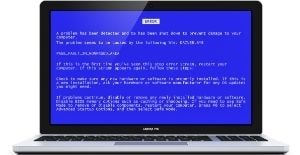How to Choose the Best Antivirus Software
Simplify your search for an antivirus software with this guide.
read morePublished on: October 1st, 2021

Computer problems are particularly frustrating, especially if yours is shutting down or crashing on the daily. If left untreated, crashes can lead to data losses, file corruption, and even damage. Pinpointing the root of the problem can help you avoid buying a new computer or needing a costly repair down the line. If you often find yourself asking, “Why is my computer crashing on a regular basis?“, we’re here to help you diagnose the issue.
Computer crashes can happen after a pop-up or alert, or one may occur out of the blue one day without any warning. Luckily, no matter whether you’re getting the blue screen of death error or your device is struggling to stay on; there’s likely a treatable cause. We’ve outlined some of the more common explanations below.
A functioning computer needs to heat up to an extent while running. However, too much heat can be a red flag and is often the leading culprit behind computer freezes and crashes. Although computers come with a built-in fan to prevent overheating, it’s easy for dust, food, and other particles to get trapped and cause your fan to malfunction. Blocked vents can also be an equal cause for concern. If your laptop or PC lacks adequate airflow, internal hardware components may get too hot, fail to function, and ultimately shut down or crash.

A faulty hard drive can also be to blame for regular computer freezes and crashes. Magnetic plates can quickly wear out from undergoing multiple rewrites, which eventually cause computer programs to run sporadically or fail to load correctly. Although it’s not always easy to identify hard drive issues, hearing persistent clicking sounds or experiencing re-booting errors can be a dead giveaway. If you’re presuming this to be the cause or are uncertain, consult with a computer repair professional. It may be necessary to back up your files to an alternate drive.
Viruses, trojans, and other unwanted software can easily wear down your operating system. To rule this out as a possible cause, try running anti-malware software, such as Malwarebytes to detect any potential threats. If this is the root issue, crashes should taper down once the malware is removed.
If you’ve ruled out the most common culprits and are still left scratching your head, try looking into your computer’s power supply. Unexplained shutdowns and reboots can signal a weak power supply that’s not transferring enough power to your device. For many, this can happen after installing external hard drives that take up too much power or even from improper handling.
As with any electronic device, taking care of your computer and investing in regular cleaning and maintenance is the best way to prevent it from crashing. To ensure your device stays in tip-top shape, we recommend you:
Although we’ve covered many of the more prominent causes of computer crashes, there are still plenty of other reasons your computer may be giving you trouble. For expert troubleshooting and repair shop services, get in touch with your nearest Computer Troubleshooters location. From device clean-ups to data backups and repairs, we offer various services to help you diagnose the issue and get your device back up and running again.
Simplify your search for an antivirus software with this guide.
read moreHave you received this notorious Windows error screen? Here’s how to fix it.
read more© 2025 Computer Troubleshooters. Privacy Policy | Terms of Service | Accessibility Statement